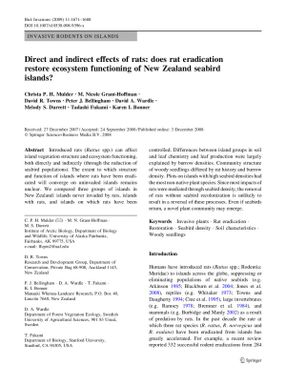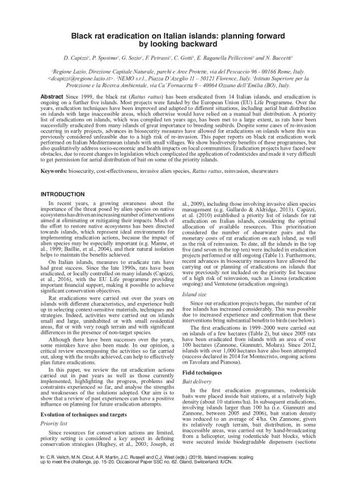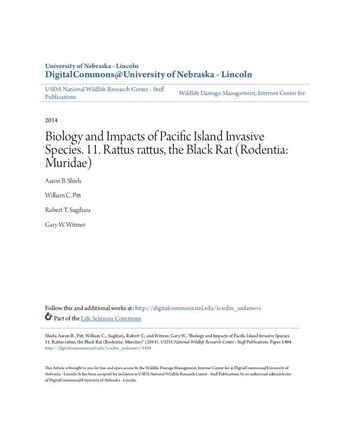Direct and indirect effects of rats: does rat eradication restore ecosystem functioning of New Zealand seabird islands?
- Description:
- Introduced rats (Rattus spp.) can affect island vegetation structure and ecosystem functioning, both directly and indirectly (through the reduction of seabird populations). The extent to which structure and function of islands where rats have been eradicated will converge on uninvaded islands remains unclear. We compared three groups of islands in New Zealand: islands never invaded by rats, islands with rats, and islands on which rats have been controlled. Differences between island groups in soil and leaf chemistry and leaf production were largely explained by burrow densities. Community structure of woody seedlings differed by rat history and burrow density. Plots on islands with high seabird densities had themost non-native plant species. Sincemost impacts of rats were mediated through seabird density, the removal of rats without seabird recolonization is unlikely to result in a reversal of these processes. Even if seabirds return, a novel plant community may emerge.
- Collections:
- Secretariat of the Pacific Regional Environment Programme (SPREP)
- Content partner:
- Secretariat of the Pacific Regional Environment Programme (SPREP)
- Availability:
- Not specified
-
Copyright status: All rights reservedFind out more about what you are able to do with this itemThis item is all rights reserved, with means you'll have to get permission from Secretariat of the Pacific Regional Environment Programme (SPREP) before using it. For more information, please see our use and reuse page.What can I do with this item?Non-infringing useNZ copyright law does not prevent every use of a copyright work, and this item may be hosted by an international institute or organisation. You should consider what you can and cannot do with a copyright work.No sharingYou may not copy and/or share this item with others without further permission. This includes posting it on your blog, using it in a presentation, or any other public use.No modifyingYou are not allowed to adapt or remix this item into any other works.No commercial useYou may not use this item commercially.
Related items
Welcome and warm Pasifik greetings
The information on this site has been gathered from our content partners.
The names, terms, and labels that we present on the site may contain images or voices of deceased persons and may also reflect the bias, norms, and perspective of the period of time in which they were created. We accept that these may not be appropriate today.
If you have any concerns or questions about an item, please contact us.


